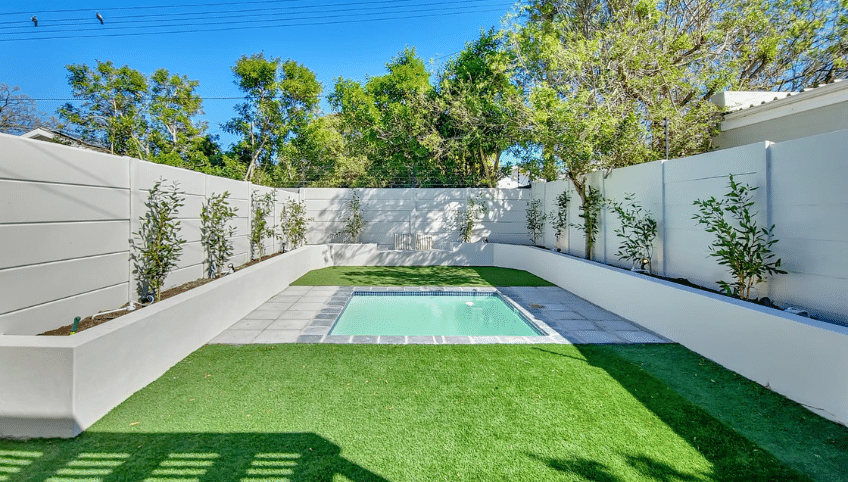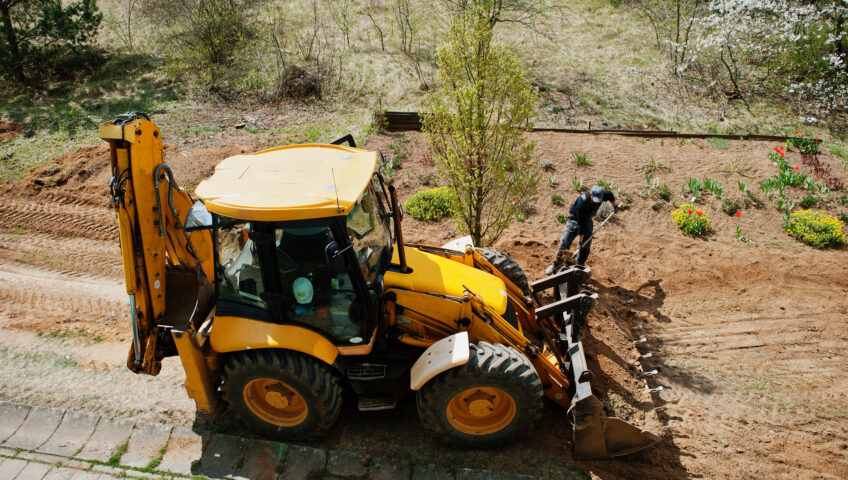Eco-friendly landscaping has become increasingly important for homeowners, businesses, and public spaces that wish to minimize their environmental impact while maintaining attractive outdoor environments. One critical aspect of sustainable landscaping is proper site grading, which directly affects water drainage, soil erosion, and vegetation preservation. By employing eco-friendly and effective site grading techniques, significant benefits can be achieved for both practical purposes and environmental protection.
In this article, we will examine the advantages of proper site grading in eco-friendly landscaping, exploring how these techniques can contribute to efficient water management, soil conservation, and enhanced aesthetic appeal. With the expert guidance provided by New Wave Earth Works, you can ensure that your landscaping project not only adheres to best practices in sustainability but also delivers lasting and visually striking results.

1. Efficient Water Management through Proper Site Grading
Proper site grading naturally directs water away from buildings and prevents ponding, which is essential for maintaining the integrity of structures, protecting property investments, and promoting public safety in Delta. Effective water management through site grading can be achieved by employing the following techniques:
– Contouring the Landscape: Grading the land in a manner that establishes gentle slopes away from structures ensures that water is effectively channeled to designated drainage areas, thus reducing the risk of flooding and water damage.
– Creating Swales and Berms: These landscape features help to capture, redirect, and slow down the flow of water, ensuring that it drains efficiently while reducing the impact on surrounding areas.
– Incorporating Permeable Surfaces: By using porous materials for walkways, driveways, and patio areas, rainwater is absorbed into the ground quickly, reducing runoff and maintaining the natural water balance within the landscape.
2. Soil Erosion Control and Prevention
Site grading plays a pivotal role in preventing soil erosion, which is crucial for preserving the land’s structural integrity and preventing unwanted sedimentation in water bodies around Delta. Proper site grading can help to protect existing vegetation and stabilize the soil by implementing the following techniques:
– Minimal Soil Disturbance: By carefully planning the construction process, vegetation, and topsoil removal can be minimized, thereby retaining the land’s natural features and helping to resist erosion.
– Grading to the Natural Topography: Adhering to the natural contours of the land ensures that existing drainage patterns are maintained, which in turn facilitates efficient water management and reduces erosion issues.
– Employing Erosion Control Measures: Eco-friendly measures like silt fences, erosion control blankets, and straw wattles can be utilized during the grading process to prevent soil from washing away and sedimentation in surrounding areas.
3. Enhancing Aesthetics and Plant Viability
Proper site grading contributes to the visual appeal and longevity of an eco-friendly landscape in Delta. By paying attention to grading, landscapers can ensure that plants enjoy suitable growing conditions and that the overall design is harmonious and practical:
– Sustainable Plant Choices: Considering the specific site conditions, such as sun exposure, water availability, and soil type, landscapers can select native plant species that thrive in Delta’s unique climate and soil, resulting in a healthy, low-maintenance landscape.
– Utilising Terracing Techniques: When working on steep slopes, terracing can be employed to create level planting areas, which not only enhances plant viability but also adds depth and visual interest to the landscape.
– Emphasising Natural Beauty: By considering the land’s natural characteristics when grading, designers can utilize existing features and organic lines to create visually striking and contextually appropriate landscaping outcomes.

4. Soil Health and Fertility Maintenance
Optimal site grading ensures the retention and efficient use of topsoil, which is the most fertile layer of soil. Maintaining soil fertility is crucial to the successful establishment and growth of new vegetation in landscapes across the Delta. Some ways in which site grading can contribute to soil health include:
– Preserving Topsoil: During construction, proper storage and safeguarding of topsoil ensure its redistribution across the landscape once the project is completed, thereby maximizing fertility and supporting plant growth.
– Preventing Compaction: Over-compacted soil can impede root growth and water absorption. By limiting heavy machinery use or employing specialized equipment, soil compaction can be avoided or minimized during the grading process.
– Enhancing Drainage: Effective site grading promotes adequate drainage while avoiding overly dry or waterlogged conditions, both of which can negatively impact soil health and overall plant growth.
5. Encouraging Sustainable Growth and Biodiversity
Eco-friendly site grading is instrumental in promoting sustainable growth and biodiversity by maintaining natural habitats, conserving soil and water resources, and selecting appropriate vegetation for the specific site conditions in Delta:
– Habitat Preservation: Proper grading techniques take into account the protection of existing ecosystems and wildlife habitats, ensuring that the landscape thrives with a diverse range of flora and fauna.
– Reducing Chemical Dependence: By conserving soil health and selecting appropriate, native plant species, eco-friendly landscaping minimizes the need for chemical fertilizers and pesticides, fostering a sustainable and healthy ecosystem.
– Carbon Sequestration: By preserving existing vegetation and planting additional trees and plants, ecosystems capture and store carbon dioxide, contributing to the fight against climate change and supporting overall environmental health.
Achieving Eco-Friendly Excellence with New Wave Earth Works
Proper site grading is an indispensable component of eco-friendly landscaping projects, ensuring efficient water management, soil conservation, enhanced plant vitality, and a harmonious aesthetic appeal in Delta. With the expert team at New Wave Earth Works, you can be confident that planning and implementation adhere to the highest standards in sustainable practices.
Whether you are undertaking a residential, commercial, or public project, New Wave Earth Works will collaborate with you to create visually stunning, environmentally responsible, and long-lasting landscapes that respect Delta’s unique natural characteristics. Contact our landscaping company in Vancouver today to learn more about our commitment to eco-friendly landscaping and site grading excellence and embark on your journey towards a greener, more sustainable outdoor environment.


